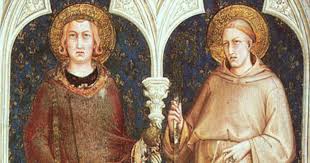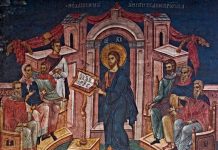An anti-Pope is someone who thinks he’s the Pope – or at least who claims to be the Pope – when in reality he is not. And by ‘reality’, we mean Pope by the will of God, as manifested in the laws of the Church. These laws include such things as the rules for conclaves, elections and, yes, resignations.
Hippolytus (170 – ca. 235) is one such figure: The history is somewhat obscure, but he was a priest of Rome who held rather rigorous views, as many did in that era, who thought the Church was too lenient and merciful on repentant sinners – particularly apostates and adulterers – by actually granting them absolution and allowing such moral reprobates back into the Church! Ad inferos cum omnibus! It seems to have been Hippolytus’ view that some sins merited exclusion from the Church – and, more than likely, from eternal life – unconditionally and irrevocably. To enforce his views, Hippolytus, sometime around the year 230, had himself elected ‘Pope’ against the true Pontiff, Pontian, whom we also celebrate today.
Thus began one of the first formal schisms in the Church, which continued until the persecution of pagan Emperor Maximinus Thrax in 235, when, to ensure there was no Pope, he sent both Pontian and Hippolytus to the Sardinian mines – a slow and torturous death sentence. While there, Hippolytus, humbled and contrite, was reconciled to the Church by Pontian, who also resigned his office on September 28, 235, the first Pope in history to do so, so that another might be elected. Pontian died in October, and Hippolytus sometime after that, and both were declared martyrs for the Faith. All’s well that ends well, even schisms and sometime anti-popes.
Hippolytus, a voluminous writer on a vast variety of theological and Scriptural topics – he was, as Pope Benedict pointed out, the first to posit December 25th as the birthday of the Christ – is somewhat ironically claimed as the source of the second, and shortest, of the three ‘Eucharistic prayers’ in the Novus Ordo (even if this connection is now disputed), the one that has God’s mercy ‘falling down like the dewfall’, or words to that effect, added in the wake of the Second Vatican Council for the Missal of Paul VI. This now often replaces the ‘Roman Canon’ – the rarely-heard ‘First Eucharistic Prayer’ in the New Mass – which had been used, right up until the revisions of 1969, and which goes back perhaps to the Apostles themselves.
Hippolytus also wrote a apocalyptic treatise on Christ and, ironically enough for an anti-Pope, the Anti-Christ, where we derive a good deal of our teaching on the latter mysterious figure, who will bring about the final ‘unleashing of evil’ near the end of time, which will prompt Christ to return in glory and triumph.
Ultimately, whether we’re near that time or not, it’s all about individual persons and our choice for or against Christ, God and our own salvation. Perseverance and hope are always rewarded, for, like Hippolytus, any wayward soul may be given the grace to see the truth in an instant, even if it requires being sent to the mines in Sardinia, breaking rocks and serendipitously meeting the real Pope to hear one’s confession to get to that point. God, after all, is a God of surprises.
The bodies of Pontian and Hippolytus were returned to Rome in triumph on this day, August 13th, 236, which is now their combined feast. May they intercede mightily for the Church in these troubled days, that the light of Christ may shine through our own darkness.
Hope, dear reader, and persevere.
Saints Pontian and Hippolytus, orate pro nobis! +










